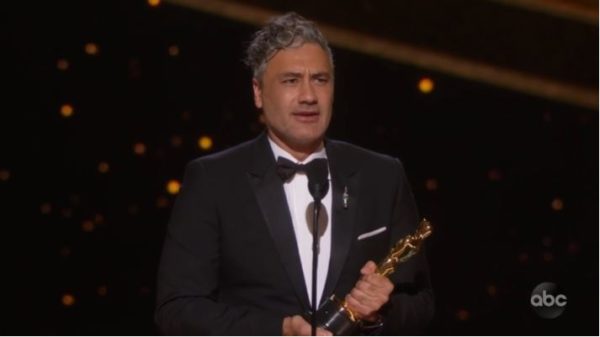
- Details
- By Rich Tupica
LOS ANGELES — Taika Waititi, a New Zealand director/actor, accepted the Academy Award last night in the Best Adapted Screenplay category for Jojo Rabbit, and his winner’s speech went beyond your typical “thank yous.” At the 92nd Oscars, held at the Dolby Theatre in Hollywood, the 44-year thoughtfully recognized not only his mother, producers and film crew, but also Indigenous people around the world.
“I dedicate this to all the indigenous kids in the world who want to do art and dance and write stories," he said in front of Hollywood-industry elites and millions of television viewers. “We are the original storytellers and we can make it here as well.”
Closing his speech, Waititi signed off with “kia ora,” a famous Māori phrase meaning “be safe.” He is the first Oscar winner of Māori decent. Māori are the tangata whenua, the indigenous people, of New Zealand. Later, the heartfelt nods continued when Waititi was introducing the winners of the Academy’s honorary prizes. That’s when he said: “The Academy would like to acknowledge that tonight we have gathered on the ancestral lands of the Tongva, the Tataviam, and the Chumash. We acknowledge them as the first peoples of this land on which the motion pictures community lives and works.” Watch his 2020 Oscar speech here.
Jojo Rabbit stars Roman Griffin Davis, Thomasin McKenzie and Scarlett Johansson. It was nominated for six Oscars, including Best Picture. This was Waititi’s third nomination.
More Stories Like This
Tunica-Biloxi Tribe of Louisiana Celebrating Its 26th Annual PowwowHere's What's Going On In Indian Country, May 17th —May 23rd
Q&A: Diné Designer and Entrepreneur Amy Denet Deal on Being Honored by CNN
Forge Project Awards $150,000 to Native American Artists
Q&A: Ojibwe Designer Lucie Skjefte on New Collaboration with Minnetonka Footwear
These stories must be heard.
This May, we are highlighting our coverage of Indian boarding schools and their generational impact on Native families and Native communities. Giving survivors of boarding schools and their descendants the opportunity to share their stories is an important step toward healing — not just because they are speaking, but because they are being heard. Their stories must be heard. Help our efforts to make sure Native stories and Native voices are heard in 2024. Please consider a recurring donation to help fund our ongoing coverage of Indian boarding schools. Donate to Native News Online today and support independent Indigenous-centered journalism. Thank you.
